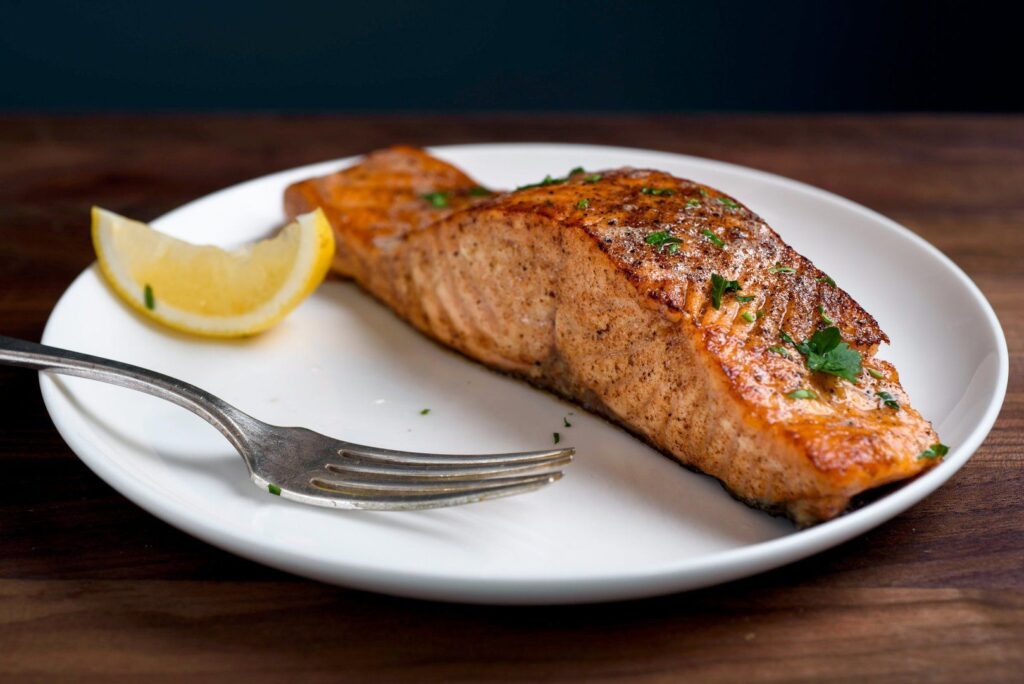Recently, the pescetarian has been on the minds of many nutritionist and those that love to work out. The reason is simple, it’s a diet that adds seafood like fish to a conventional vegetarian diet. It is for people who want the health benefits of a plant-based diet while not being ready to give up meat entirely. It removes red meat and poultry from the diet while allowing fish and other seafood. Others switch to the pescetarian diet to reduce their carbon footprint.
This article will explore the foods you can consume on the pescetarian diet and the benefits and drawbacks of adopting it.
How The Pescetarian Diet Works
The pescatarian diet is simply one that doesn’t allow for poultry or red meat but includes seafood like shrimp. The term originates from the Italian word for fish, “pesce,” and the word “vegetarian.” It is sometime spelt as pescatarian. Most scientific literature classifies this diet as a form of vegetarianism.
A pescetarian is a person who adopts the pescetarian diet, and they typically consume a diet that’s mostly made from fresh produce, healthy fats, legumes, nuts, whole grains, and seafood. Seafood typically serves as the primary source of protein, so the diet allows you to enjoy lots of seafood. Many people on the pescetarian deity also consume eggs and dairy products.
Being on the pescetarian diet doesn’t mean you get to eat all the junk food you want while avoiding red meat and poultry. The benefits you get from not consuming red meat and substituting fish in their place won’t make up for all the problems processed and junk foods. For example, you shouldn’t be eating things like fish sticks when there are healthier ways to prepare fish.
Some of the reasons why you should consider giving the pescetarian diet a try include:
1) Provides Health Benefits
Consuming a primarily plant-based diet provides you with many health benefits like making it easier to manage your weight, a lower risk of diabetes, and a lower risk of heart disease. People on the pescetarian diet also get to enjoy these benefits.
For example, research shows that women on the pescetarian diet gained 1.1 kilograms less than women who consumed meat. The study also showed that people who shifted to diets that consisted of primarily consuming plants gained the least weight, showing that reducing your animal consumption regardless of your diet makes it easier to manage your weight.
Research also shows that people on the pescetarian diet have a lower risk of developing diabetes than omnivores. Pescatarians also have a 22 percent lower risk of dying due to heart disease than people who regularly eat all types of meat.
2) Lowers Your Carbon Footprint
Raising livestock for consumption has a high cost to the environment. The United Nations states livestock currently accounts for about 15 percent of carbon emissions caused by humans. However, raising fish and other seafood for consumption doesn’t put as much stress on the environment.
Research shows that people who only consume fish cause 46 percent less greenhouse gas emissions than those who consume at least one serving of meat per day.
3) Less Controversial
Some people turn to vegetarianism because of ethical reasons. They might have a problem with how animals are treated at factory farms or the methods used to process the animals. Others oppose how resources like land are devoted to growing grain for livestock consumption while so many humans on the planet go hungry.
Switching to a pescetarian diet can address some of these concerns, but it should be noted that overfishing and aquaculture can also be an issue.
The Standard Pescetarian Diet
Some of the things you’re allowed to eat on the pescetarian diet include:
- Legumes like beans and foods made from them like tofu;
- Whole grains and foods made from whole grains;
- Nuts, seeds, peanuts, and the kinds of butter made from them;
- Dairy products like cheese, milk, and yogurt;
- Vegetables;
- Fruits;
- Eggs, and;
- Fish and shellfish.
Foods you should avoid on the pescetarian diet include:
- Chicken;
- Pork;
- Lamb;
- Turkey;
- Wild game, and;
- Beef.
Reasons To Add Fish To A Vegetarian Diet
Take away the fish and seafood, and a pescetarian diet looks much like a vegetarian diet. Some of the benefits of adding fish to a vegetarian diet include:
1) Reduces Your Risk Of Nutritional Deficiencies
Adding fish to a vegetarian diet might be better for your health since people who completely remove animal flesh and products from their diet have a higher risk of being deficient in essential nutrients like zinc, calcium, and vitamin B12.
Adding seafood like fish, shellfish, and crustaceans to a vegetarian diet gives you a better source of these essential nutrients. For example, mussels are rich in nutrients like selenium, manganese, and B vitamins.
2) Great Source Of Omega-3 Fatty Acids
Another benefit of substituting fish for red meat and poultry is the omega-3 fatty acids in fish. Some plants, like walnuts, contain a type of omega-3 fat (alpha-linolenic acid), but these fats aren’t easily converted to eicosapentaenoic (EPA) and docosahexaenoic acid (DHA) in the body.
EPA and DHA provide various health benefits like improving brain function, mood, and heart health. Oily fish like sardines and salmon contain EPA and DHA in a form that is easy for the body to use. It’s why many doctors recommend consuming fish at least twice a week.
3) Great Source Of Protein
Most importantly, adding fish to a vegetarian diet makes it easier to get enough protein as your body needs daily. The average person needs about 0.8 grams of protein for each kilogram of body weight to stay healthy. You need up to two grams of protein for each kilogram of bodyweight if you’re looking to build muscle.
It can be challenging to get as much protein as you need while restricting your food intake to only plants, especially if you’re also trying to minimize your carbohydrate intake. Fish and other types of seafood are excellent sources of lean protein.
4) Gives You More Options
Many people find vegetarianism to be too restrictive. Adding fish and other seafood to the diet gives you more meal options. If your food choices are motivated by health reasons, the pescetarian diet gives you a less restrictive option since there are many types of seafood and countless ways to prepare them.
You may also like:




















